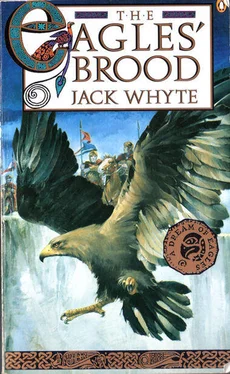Within two weeks of being allowed to leave my bed, Lucanus permitted me to mount a horse, and from that moment on I fretted impatiently, waiting for Donuil to ride off on an errand to some neighbouring farm. As soon as he did so, I made my way directly to the valley again, dreading what I might find, but fearing even more the burden I would bear if I allowed my fear to stop me from going back.
Nothing had changed. The tiny grave was there, grown over now with weeds, since Donuil had been held in Camulod, tending to me. I walked to the water's edge and found the spot where I had knelt that day, and I knelt there again, waiting to be assailed afresh, but nothing happened. I gazed across the surface of the tiny lake and saw only the trees on the other bank. My logic had been correct, I realized; the phantasms that had plagued me had sprung from the pressures in my head.
I became aware of the anomaly before I actually looked at it. It was merely there, present, a strangeness that attracted me by its very difference. Even when I focused on it, I could not see what it was. It lay just out of reach, a stick of some description, short and thick and absolutely straight, hanging vertically in the clear water between two clumps of reeds. I looked more closely, then realized it was too short. It did not reach all the way to the bottom but merely hung there vertically, waterlogged in some strange fashion. Idly, I splashed my hand towards it, trying to make it move. The water churned around it, but it hung there almost motionless, as though anchored. And then I saw the loop, floating almost invisibly just below the surface. I stood up and stepped into the water, sinking almost to the knees in the muddy bottom as I reached out and grasped the thing. It was slick and greasy in my grip, covered in algae, but it came to me easily as I pulled and lifted it. It was a man-made shaft, not a stick, and it ended in a fitted iron butt from which depended a length of chain and a heavy iron ball, rusted to the colour of the mud on the bottom. My flail! And yet I knew immediately it could not be, for mine was lying somewhere up in the Mendip Hills, wrapped around the skeletal wrist of the man who had last swung it.
If you don't hit me with yours... The words rang clearly in my head and the voice was mine, but to whom had I said that? I looked at the dripping weapon in my hand and heard more words.
Can't you imagine what that thing would do to a man on foot if you swung it round your head?
It would impress him.
Aye, helmet, skull and all...
I promise not to hit you with mine if you don't hit me with yours.
Uther! The other voice was Uther's! But when had we said those words? I promise not to hit you with mine if you don't hit me with yours... And then it came to me. It had been the morning of the day we set out against Lot's first invasion, the last time I saw my father alive. And suddenly my father's face was there in my mind, twisted in death as he sprawled in rigor mortis across his bed, and I felt a stab of agony as I remembered, not yet aware that I was remembering. Then, incongruously, I heard Aunt Luceiia's voice: Her injuries were awful, as though she had been battered to death, her skull completely crushed... Then Uther's voice again: The bitch! I'll find her later and teach her a lesson she won't soon forget...
The voice I heard screaming then was my own, as all the agony and grief, the sudden realization of my lost love, crashed down on me at once and I staggered round to look at—and this time really to see—the piteous, weed-strewn little grave that contained my beloved, my dreams and my life.
Publius Varrus remarked several times in his writings, and I have always agreed with him, that words, the strongest tool men have for communicating ideas, are hopelessly inadequate for the tasks we sometimes ask of them. This is most particularly, and inevitably, true when we find ourselves struggling to describe the most basic and fundamental human emotions: love and happiness; hate and bitterness; grief and anguish. I have no recollection of kneeling there by that graveside or of what thoughts passed through my mind. I only know that when I became aware again of the world around me, night was falling quickly, my thighs were quivering with exhaustion, and the grave before me had been plucked clean of weeds, its edges smoothed and its surface, bearing multiple imprints of my palms, patted flat. My mind was also filled with a decision made, and my breast was filled with a cold and reasoned, emotionless placidity that entailed an utter and complete knowledge of what I had to do.
Sometime later, still filled with that unutterable calm, I opened the door to Luceiia's family room and stopped short on the threshold, stunned by the sight of her in the lamplight and suddenly aware, from a completely new perspective, of another dimension to all I had lost through my illness. She was no different from when I had last seen her earlier that day, but now I remembered the beloved Luceiia Britannicus who had ridden with me to meet Cassandra just two years before, and this was a different person. Those two years had wrought enormous changes in my aunt. She had shrunk, and looked tiny and fragile. And yet the same lively wit and beauty sparkled from those great, indomitable blue eyes as she turned to look at me.
She recognized the change in me immediately.
"You remember!"
I nodded, mute, still standing in the doorway, and she moved to me quickly, drawing me into the room, her eyes already awash with tears.
"Thank God, Caius, thank God! What happened? How? Have you told Lucanus? Does anyone else know?"
I shook my head, still wordless, answering all her questions with one gesture, my throat completely choked by a great, swelling lump of grief and misery. And then the dam broke and I was riven by a violent, wrenching sob and gave way completely to the pain inside, allowing it to overwhelm me. I felt my aunt's arms go around my waist and I enfolded her in my own, feeling the smallness of her and the love and sadness that frailty brought me as I cradled her gently and allowed my tears to fall unchecked into her silver hair. When the paroxysm had subsided, she led me to a chair and pressed me down into it, then sat close to me and watched me until I had mastered myself again. She made no attempt to speak, waiting in wisdom for me to begin. I was in no hurry. I sat there, empty now, my eyes closed, and waited until I felt the resolute calmness I had previously felt reentering my body "and filling me to the point where I could speak again. Finally I opened my eyes and looked at her. Her own eyes were filled with love and concern.
"Auntie, when exactly did Cassandra...when was she killed?"
She gazed at me. "You have been there again? To the grave?"
I nodded. "That's where I remembered. When, Auntie?"
She shook her head, a troubled frown on her brow. "We don't know exactly, but it was soon after you left for Verulamium. She left here to return to your little valley ten days after your own departure. She was happy there, and lonely here. She was heavy with the child, of course, but she was healthy and blooming and still well short of her term, so I saw no reason to keep her here...not when her heart was so obviously there..." Her voice faded, then resumed. "I expected her to return within the week, but even when the week passed with no sign of her I was not concerned. The weather was clement, better than it had been all summer, and she had taken the little two-wheeled cart, so she was well stocked with provisions. It was only after ten days that I began to wonder, and so when Daffyd arrived that same day, I asked him to go and visit her, just to be sure."
"Daffyd? It was Daffyd who found her?"
My aunt nodded, miserably. "She had been dead for some time by then. More than a week, Daffyd thought. Poor Daffyd. He found her, and he cleaned her, and he buried her. Then he came back and told us."
Читать дальше









